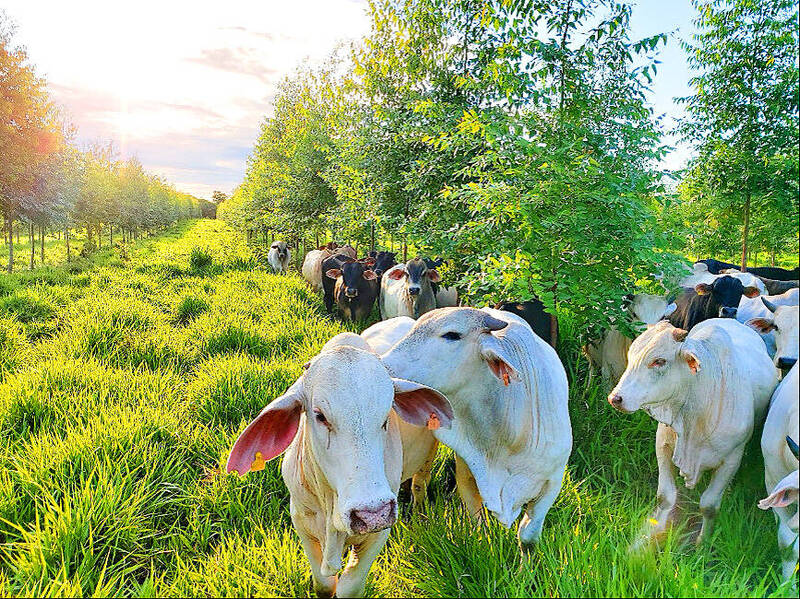《TAIPEI TIMES》Exchange lists first green carbon project

A herd of cattle grazes in Paraguay in an undated photograph. Photo courtesy of the Taiwan Carbon Solution Exchange
HELPING AN ALLY: The project is an afforestation initiative in Paraguay, which needs backing to protect and develop its forests, the Taiwan Carbon Solution Exchange said
Staff writer, with CNA
The Taiwan Carbon Solution Exchange (TCX) has listed its first green carbon project, and expects it to generate carbon credits for 10,000 tonnes of carbon.
The newly listed project is an afforestation initiative in eastern Paraguay, a diplomatic ally of Taiwan, and carbon credits for the project are available for purchase, the TCX said in a statement on Monday.
However, the TCX provided no other details regarding the nature of the project or how far along it is.
The exchange said it was crucial for Paraguay to receive support to develop and protect its forests, as well as to promote carbon reduction initiatives, because its forest cultivation regulations are underdeveloped.
A significant share of Paraguay’s land is also used for cattle and soy farming, the TCX said.
Beef has the biggest carbon footprint of any food, Greenpeace Taiwan has said.
Soy cultivation contributes to carbon emissions and deforestation in many South American countries, including Paraguay, the World Wildlife Fund says.
The green carbon project is the second nature-based solution to comply with international carbon neutrality standards, such as ISO 14068-1, and to be listed on the exchange, the TCX said.
The first nature-based solution — a blue carbon project involving mangroves in Myanmar — was launched in June, it said.
Nature-based solutions “are actions to protect, sustainably manage and restore natural and modified ecosystems in ways that address societal challenges effectively and adaptively, to provide both human well-being and biodiversity benefits,” the International Union for Conservation of Nature says.
Green carbon and blue carbon projects are different types of nature-based solutions. Green carbon refers to carbon stored by terrestrial ecosystems, mainly land-based vegetation such as forests, while blue carbon refers to carbon stored in marine and coastal ecosystems.
The two nature-based solution projects were established in accordance with Ministry of Environment regulations and TCX’s operational procedures, and would be analyzed by researchers at Taiwanese universities, the exchange said.
The TCX was set up in August last year and began trading carbon credits in December. It is Taiwan’s only certified exchange for trading on international voluntary carbon markets.
Separately, the Ministry of Environment (MOENV) said yesterday that it expects sales of domestic carbon credits on the TCX to begin by late September or early October.
The MOENV gave the timeline following the public release of regulations on the trade and transfer of domestic carbon credits from voluntary emission reduction projects set to be introduced on Aug. 15.
MOENV Climate Change Administration Deputy Director-General Huang Wei-ming (黃偉鳴) said the estimate was based on the time needed to complete administrative procedures.
“We can only commission the TCX to be the trading platform with the regulations in place, and time is needed for our system on emission reduction to coordinate with the TCX’s trading system,” he added.
Under the regulations, the TCX will be the only certified platform for the trade and auction of domestic carbon credits.
According to the MOENV, the regulations, including the ban on private brokerage, consignment or trade of domestic carbon credits, guarantee trade security and ensure transparency.
Information about the credits, such as project type and duration of the monitor, will be coded to ensure the effectiveness of the credits for trade, auction, and use (for carbon offset) and to prevent “greenwashing,” the ministry said.
Only sellers who have had their emission reduction projects overseen by the government will be permitted to auction or sell domestic carbon credits, it said.
The buyers will be limited to those allowed to acquire carbon credits to offset their emissions under Article 26 of the Climate Change Response Act (氣候變遷因應法), including those who emit more than 25,000 metric tons of carbon dioxide equivalent per year and are scheduled to be charged with carbon fees later this year.
In addition, buyers will be banned from reselling traded or auctioned domestic carbon credits on the TCX to “ensure market stability,” the ministry said.
新聞來源:TAIPEI TIMES












